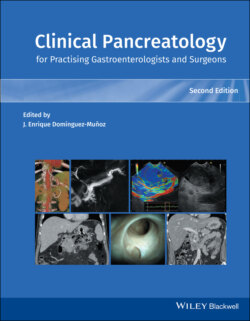Читать книгу Clinical Pancreatology for Practising Gastroenterologists and Surgeons - Группа авторов - Страница 156
CFTR
ОглавлениеCystic fibrosis transmembrane conductance regulator (CFTR) is a membrane protein and chloride channel in vertebrates that is essential for ductal fluid and HCO3 – secretion [109] (see Figure 12.2). CFTR dysfunction due to either reduced expression or reduced activity has been increasingly recognized as a critical risk factor for AP and chronic pancreatitis and is also associated with hereditary pancreatitis [110–112]. Defects of the CFTR gene have been reported to be present in up to 34% of paediatric cohorts with recurrent AP [113]. Pancreatic fluid and bicarbonate secretion appear to be protective in AP, as suggested by CFTR −/− mice that have more severe pancreatitis in experimental mouse models [114]. Furthermore, common pancreatic toxins not only damage acinar cells but also decrease fluid and HCO3 – secretion by ductal cells [111]. Recently, experimental mouse models of autoimmune pancreatitis have been identified with decreased CFTR levels [115]. The CFTR corrector C18 and potentiator VX770 as well as VX‐809 (lumacaftor) rescued CFTR expression and localization with decreased inflammation and reduced tissue damage in experimental pancreatitis models [116]. These studies indicate the possible utility of CFTR correctors already approved by the FDA, with potential in recurrent pancreatitis, hereditary pancreatitis, and chronic pancreatitis.
